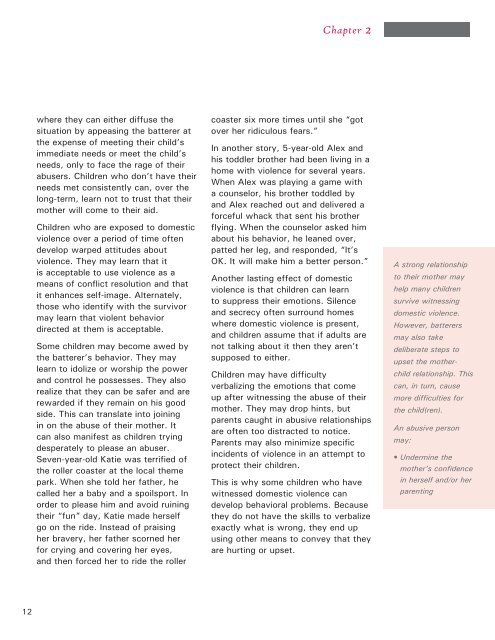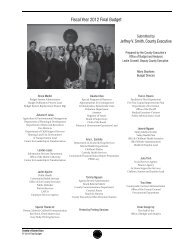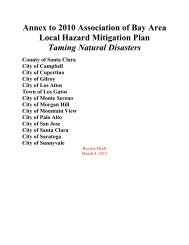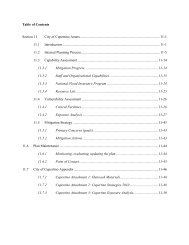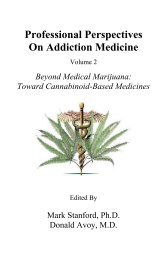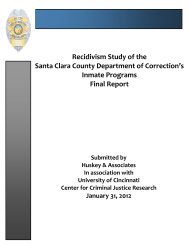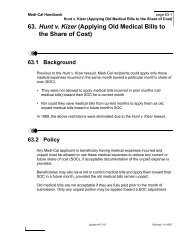Through Their Eyes: Domestic Violence and It's Impact on Children
Through Their Eyes: Domestic Violence and It's Impact on Children
Through Their Eyes: Domestic Violence and It's Impact on Children
You also want an ePaper? Increase the reach of your titles
YUMPU automatically turns print PDFs into web optimized ePapers that Google loves.
Chapter 2<br />
where they can either diffuse the<br />
situati<strong>on</strong> by appeasing the batterer at<br />
the expense of meeting their child’s<br />
immediate needs or meet the child’s<br />
needs, <strong>on</strong>ly to face the rage of their<br />
abusers. <strong>Children</strong> who d<strong>on</strong>’t have their<br />
needs met c<strong>on</strong>sistently can, over the<br />
l<strong>on</strong>g-term, learn not to trust that their<br />
mother will come to their aid.<br />
<strong>Children</strong> who are exposed to domestic<br />
violence over a period of time often<br />
develop warped attitudes about<br />
violence. They may learn that it<br />
is acceptable to use violence as a<br />
means of c<strong>on</strong>flict resoluti<strong>on</strong> <str<strong>on</strong>g>and</str<strong>on</strong>g> that<br />
it enhances self-image. Alternately,<br />
those who identify with the survivor<br />
may learn that violent behavior<br />
directed at them is acceptable.<br />
Some children may become awed by<br />
the batterer’s behavior. They may<br />
learn to idolize or worship the power<br />
<str<strong>on</strong>g>and</str<strong>on</strong>g> c<strong>on</strong>trol he possesses. They also<br />
realize that they can be safer <str<strong>on</strong>g>and</str<strong>on</strong>g> are<br />
rewarded if they remain <strong>on</strong> his good<br />
side. This can translate into joining<br />
in <strong>on</strong> the abuse of their mother. It<br />
can also manifest as children trying<br />
desperately to please an abuser.<br />
Seven-year-old Katie was terrified of<br />
the roller coaster at the local theme<br />
park. When she told her father, he<br />
called her a baby <str<strong>on</strong>g>and</str<strong>on</strong>g> a spoilsport. In<br />
order to please him <str<strong>on</strong>g>and</str<strong>on</strong>g> avoid ruining<br />
their “fun” day, Katie made herself<br />
go <strong>on</strong> the ride. Instead of praising<br />
her bravery, her father scorned her<br />
for crying <str<strong>on</strong>g>and</str<strong>on</strong>g> covering her eyes,<br />
<str<strong>on</strong>g>and</str<strong>on</strong>g> then forced her to ride the roller<br />
coaster six more times until she “got<br />
over her ridiculous fears.”<br />
In another story, 5-year-old Alex <str<strong>on</strong>g>and</str<strong>on</strong>g><br />
his toddler brother had been living in a<br />
home with violence for several years.<br />
When Alex was playing a game with<br />
a counselor, his brother toddled by<br />
<str<strong>on</strong>g>and</str<strong>on</strong>g> Alex reached out <str<strong>on</strong>g>and</str<strong>on</strong>g> delivered a<br />
forceful whack that sent his brother<br />
flying. When the counselor asked him<br />
about his behavior, he leaned over,<br />
patted her leg, <str<strong>on</strong>g>and</str<strong>on</strong>g> resp<strong>on</strong>ded, “It’s<br />
OK. It will make him a better pers<strong>on</strong>.”<br />
Another lasting effect of domestic<br />
violence is that children can learn<br />
to suppress their emoti<strong>on</strong>s. Silence<br />
<str<strong>on</strong>g>and</str<strong>on</strong>g> secrecy often surround homes<br />
where domestic violence is present,<br />
<str<strong>on</strong>g>and</str<strong>on</strong>g> children assume that if adults are<br />
not talking about it then they aren’t<br />
supposed to either.<br />
<strong>Children</strong> may have difficulty<br />
verbalizing the emoti<strong>on</strong>s that come<br />
up after witnessing the abuse of their<br />
mother. They may drop hints, but<br />
parents caught in abusive relati<strong>on</strong>ships<br />
are often too distracted to notice.<br />
Parents may also minimize specific<br />
incidents of violence in an attempt to<br />
protect their children.<br />
This is why some children who have<br />
witnessed domestic violence can<br />
develop behavioral problems. Because<br />
they do not have the skills to verbalize<br />
exactly what is wr<strong>on</strong>g, they end up<br />
using other means to c<strong>on</strong>vey that they<br />
are hurting or upset.<br />
A str<strong>on</strong>g relati<strong>on</strong>ship<br />
to their mother may<br />
help many children<br />
survive witnessing<br />
domestic violence.<br />
However, batterers<br />
may also take<br />
deliberate steps to<br />
upset the motherchild<br />
relati<strong>on</strong>ship. This<br />
can, in turn, cause<br />
more difficulties for<br />
the child(ren).<br />
An abusive pers<strong>on</strong><br />
may:<br />
• Undermine the<br />
mother’s c<strong>on</strong>fidence<br />
in herself <str<strong>on</strong>g>and</str<strong>on</strong>g>/or her<br />
parenting<br />
12


